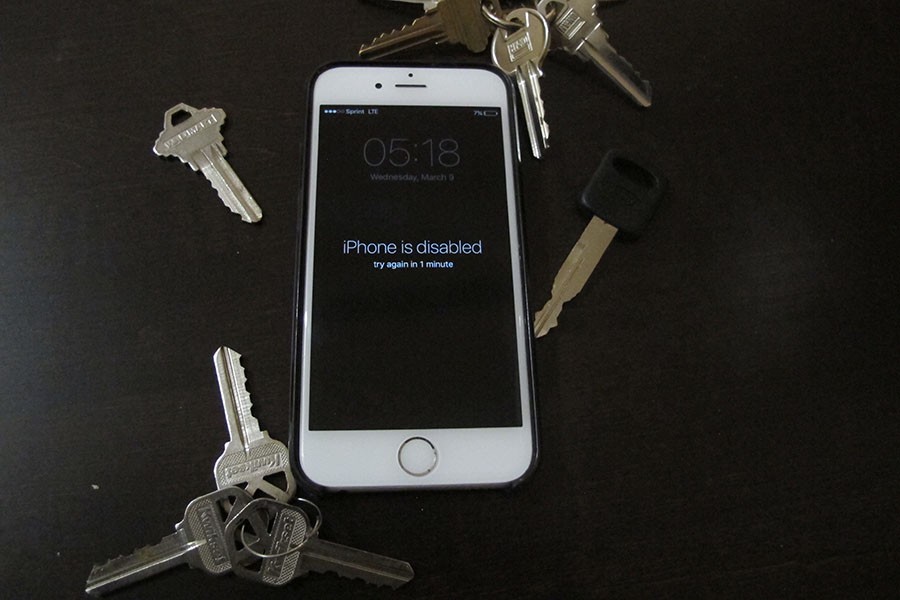Opinions: Rocca-ing the world: High key risk
The FBI vs. Apple controversy
A disabled iPhone like this is the same problem the FBI is having, except the iPhone they are dealing with is locked forever.
Every Friday, my Senior Composition class has a timed write over current issues. Last Friday’s topic got me more heated than usual.
The topic was Apple’s refusal to unlock a phone that belonged to the terrorists Syed Rizwan Farook, his wife Tashfeen Malik and his neighbor Enrique Marquez, keeping information in the phone secret from the government.
It’s not that Apple doesn’t want to help the FBI, it’s that they are protecting their customers, nearly 75.23 billion people worldwide.
Being an avid iPhone user, I took this issue to heart.
Technology infiltrates the lives of every American in ways beyond anyone would have ever imagined.
And here’s the issue: the collective history of everyone’s lives are on those phones.
That tiny, glass computer I keep in my pocket holds more information than I could ever store in my brain–passwords, bank account information, songs, health information, reminders, calendars, photos, messages, phone logs… the list is frighteningly endless.
If all of this information leaks out, that would absolutely devastate people’s lives: work, financial and private.
Technology, whether anyone wants to admit it, has taken over.
At work, at school, in cars, on airplanes, in coffee shops and in our own homes.
People constantly use computers and phones for papers, communications, games and answers.
The scary scenarios are also endless.
Someone hacks into tens of millions of bank accounts because they somehow found access to this universal “key” the government is proposing Apple make.
The economy would be wrecked.
People’s lives could spiral completely down the drain.
And for what? For victory in a court case?
Yes, they need to catch these real-world bad guys. Their actions are inexcusable and horrible.
But shouldn’t the FBI have other ways to catch him? Shouldn’t a government program years in the making have other ways of finding information?
After all, technology like Apple phones hasn’t always been around, and they still caught suspects when it wasn’t around.
And legally this action would go against the Fourth Amendment.
I repeat: Against. The Fourth. Amendment.
It protects people’s rights to privacy by stating that citizens cannot be searched without reasonable justification not just because authorities are trying to find proof of known illegal activity.
Finding that proof is the FBI’s job. Not Apple’s.
And, sorry-not-sorry, while the assassins can and should rightfully have their rights to privacy revoked, everyone with an iPhone should not suffer the consequences of their actions.
No one should have to worry about their bank account’s safety or suffer from a stalker hacking into their personal calendar because of other people’s mistakes.
The FBI has to figure out their own way of accessing that information unless we want private companies to become part of the government.
These mass shootings are sad and unfortunate, but creating a “key” to the iPhone to catch a few criminals would create more chaos than peace of mind.
The criminal rate would skyrocket if any wrong person found access to the key.
Mr. Tim Cook, Apple CEO, stated in a letter that the key would be indestructible if they ever made it.
Some editors of a newspaper had the audacity to say that Mr. Cook is wrong.
So to those people telling Apple to “destroy the key after it’s made,” I’ll make it a little more clear: Tim Cook said doing that is impossible.
Technology does not work like that.
Once something is created, it’s virtually and technologically there forever.
But if the people writing Apple, telling them to make a “destroyable key,” can somehow outsmart the Apple CEO and make that themselves, they should go for it.
That would be the ideal solution, right?
Until then, Apple should keep doing the right thing by thinking long and hard, explaining and writing thoroughly the consequences this “key” could have on the lives of tens of millions of people around the globe.
The FBI has identified limitations within their own organization. Their time would be more productively spent trying to solve those inadequacies by recruiting bright, innovative technical minds instead of making Apple bend to the FBI’s will.
Your donation will support the student journalists of Eureka High School - MO. Your contribution will allow us to purchase equipment and cover our annual website hosting costs.

This is Lauren's second year on staff. You can follow her on twitter @lroccaEHS_hub. Her hobbies include Golden Line. Outside of school she is involved...























